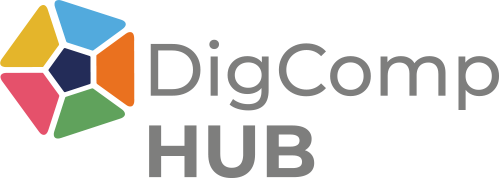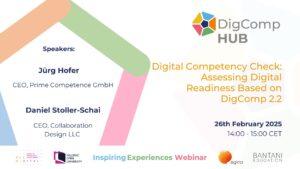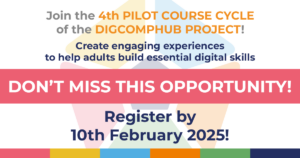The DigCompHub Inspiring Experiences webinar on March 6th, 2025 is organized, in collaboration with the Digital Skills and Jobs Platform, as a follow-up of the Digital Skills Talk n° 9 on “DigComp’s role in mapping and assessing Digital Skills: insights from Austria and Latvia”, hosted by the Platform on 30 January 2025. In this webinar, we shall explore further the experiences of mapping educational offers to DigComp in Austria and Latvia.
Austria’s progress toward a unified mapping approach
In September 2024, Austria published the National Framework of Reference for Digital Competence based on the DigComp 2.3 AT model. This framework supports decision-makers, education and training providers, and learners in making digital skills visible and comparable, guiding both educational development and individual competence growth.
Austria has a strong tradition of mapping non-formal courses to DigComp AT. The focus is now on a nationwide implementation by mapping both formal and non-formal education and training offers through two envisioned approaches:
- Self-classification – which allows training providers to map their courses independently, supported by trainings and materials to help them define learning outcomes and integrate them into educational offers.
- Quality-assured mapping – this expert-led process, relevant for providers issuing certificates, evaluates final assessments, learning objectives, and course content, ensuring quality but requiring more time, effort, and resources.
In this webinar, Irene Besenbaeck and Michaela Preuner from the Digital Skills Office at the OeAD will present Austria’s current mapping processes, key stakeholders, and their vision for a unified system that balances quality and scalability.
Latvia’s experience mapping adult education programs and technology academic courses to DigComp 2.2
Since early 2024, DigComp 2.2 has been defined as the reference framework for mapping and evaluating adult education programs in the digital skills area in Latvia. Thanks to EU funding and National budget support, experience has been gathered in mapping to DigComp professional development programs and non-formal education programs for adults. In addition, university courses on language technology, HPC, and quantum technology fields have been evaluated in the light of DigComp competences at the highest proficiency levels 7 and 8.
In this webinar, Māra Jākobsone, Digital skills policy senior expert at the Latvian Information and Communication Technology Association (LIKTA) will present, in particular, the current experience in Latvia of mapping adult education formal and non-formal programs to DigComp 2.2. She will also illustrate plans to use DigComp as the Latvian Digital Skills National Framework.
Agenda of the webinar
14:00 – 14:30 CET The Austrian experience
14:30 – 14:40 CET First Q&A session
14:40 – 15:10 CET The Latvian experience
15:10 – 15:20 CET Second Q&A session






